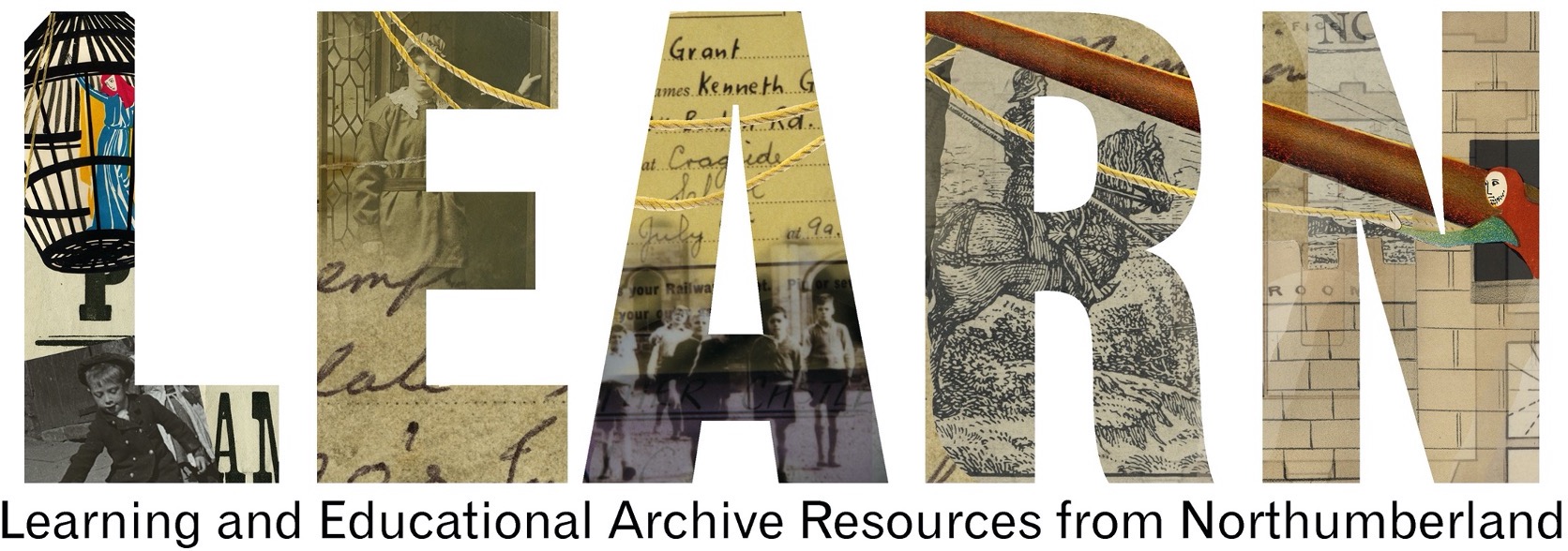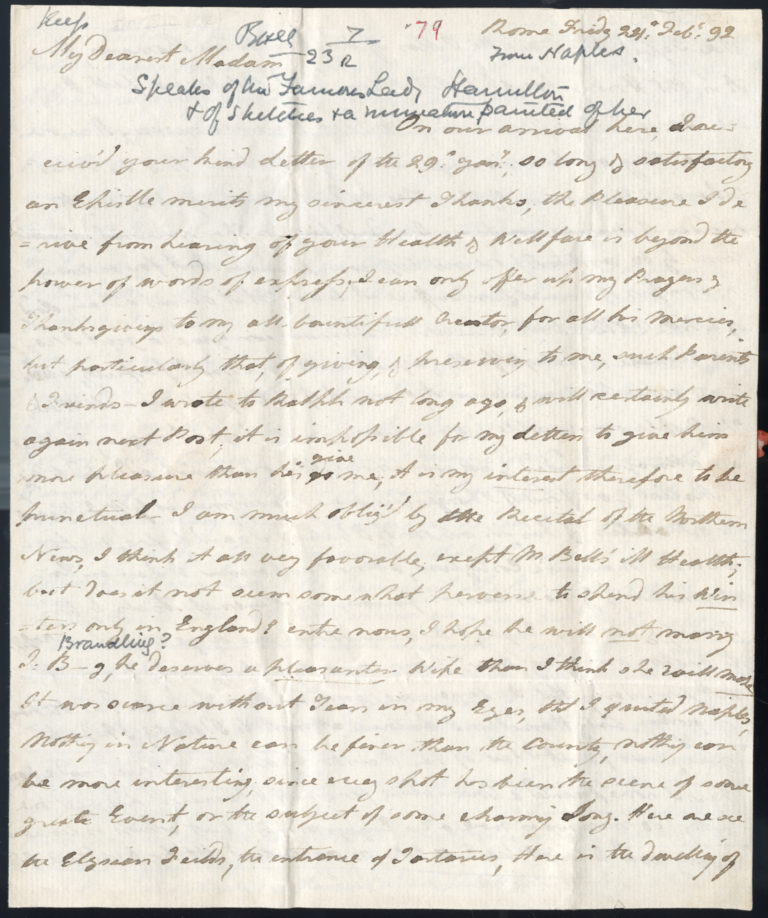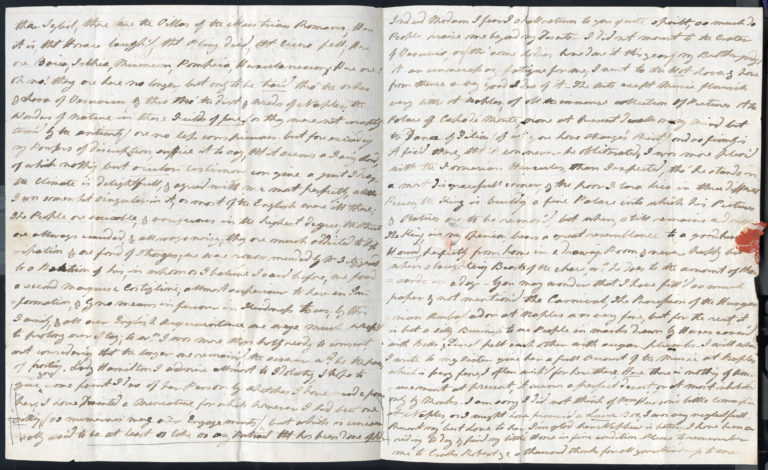Letter from Harriet Carr about Travelling and Visiting Mount Vesuvius, 1792
Reference: ZCE F/1/1/4/1
Suggested age groups: KS2, KS3, KS4, Lifelong Learners
Subject areas: History, Art, Literacy, Geography
CONTEXT
During the 18th and 19th century, it was fashionable for wealthy British families to send their sons, and occasionally daughters, on a Grand Tour. This saw privileged young men and women setting off usually from London to travel across Europe. The tourists were affluent enough to spend multiple years on the Tour. They would often carry letters of introduction with them to integrate into society while abroad.
John Carr (1764-1817) and Harriet Carr (1771-1848) were siblings who set out on their Grand Tour in 1791, returning to England in 1794. They were the children of successful northern businessman Ralph Carr and his wife Isabella.
Ralph and Isabella were initially against Harriet going on the Grand Tour but eventually gave their approval because it was thought that the tour would benefit Harriet’s health – she had a cough thought to be tuberculosis. Some of their objections were around fears of the political situation in Europe and potential dangers to travellers. John and Harriet’s ultimate destination was Italy, travelling via France and Switzerland.
John and Harriet spent almost six months in Rome with short trips to Bologna, Florence, Naples, and Turin. They had planned to leave for England in early 1792 but the outbreak of the Franco-Austrian War prevented this. They returned to Florence in May 1792, staying there until November 1793. In December 1793 John and Harriet made a final visit to Rome before leaving for England and arriving home in the summer of 1794.
Harriet is writing to her mother Isabella Carr from Rome, Italy. She and her brother John have recently arrived there from Naples. Harriet gives a heartfelt description of Naples, its people, who she judges are ‘much affected to dissipation & are fond of strangers’, and the surrounding area calling it ‘a fairy land’. The letter was written during the early part of John and Harriet’s stay in Italy and Harriet’s enthusiasm might have been due to the novelty of new experiences.
Harriet describes visiting Mount Vesuvius reporting that she ‘…did not mount to the crater of Vesuvius, as (tho’ some Ladies have done it this year) my Brother judged it an unnecessary fatigue; I went to the Hot Lava & have from thence a very good Idea of it’.
Vesuvius was a popular visitor destination from Naples. An eruption in AD 79 destroyed Roman cities including Herculaneum and Pompeii. In the 18th century Herculaneum and Pompeii were re-discovered and excavated leading to a huge public interest in the sites.
Almost all of Harriet’s Grand Tour letters include reference to her interest in art and her efforts to improve her own artistic knowledge and skills. While in Italy she created a number of paintings and portraits which she brought home with her.
Harriet appears to have been inspired by her visit to Vesuvius. The paintings that she brought home include the two shown below, described as Herculaneum or Pompeian figures drawn about 1792. We know from this that Harriet was inspired not just by the galleries that she visited but also by some of the ancient sites she saw.
In the letter Harriet also mentions sketching and painting Lady Hamilton. This is Emma Hamilton (1765-1815), model and actress who married Sir William Hamilton, the British Ambassador to Naples. As the wife of the Ambassador to Naples, Emma Hamilton was at the heart of Neapolitan society. Harriet’s friendship with Emma Hamilton shows the social circles that she was part of. We also learn from the letter that John and Harriet were mixing with Italian society.
Rome Frid[a]y 24th Feb[ruar]y [17]92
My Dearest Madam
On our arrival here, I receiv’d your kind Letter of the 29th Jan[uar]y, so long & satisfactory an Epistle merits my sincerest Thanks; the pleasure I derive from hearing of your Health & welfare is beyond the power of words of express(sic); I can only offer my Prayers & Thanksgiving to my all-bountifull Creator, for all his Mercies, but particularly that, of giving, & preserving to me, such Parents & Friends. I wrote to Ralph not long ago, & will certainly write again next Post; it is impossible for my Letters to give him more pleasure than his give me; it is my interest therefore to be punctual. I am much oblig’d by the Recital of the northern News, I think it all very favourable, except M Bell’s ill Health; but does it not seem somewhat perverse to spend his Winters only in England? entre nous, I hope he will not marry I. B[randlin]g, he deserves a pleasanter Wife than I think she will make[.] It was scarce without Tears in my Eyes, that I quited Naples, nothing in Nature can be finer than the Country, nothing can be more interesting, since every spot has been the scene of some great Event, or the subject of some charming Song. Here we see the Elysian Feilds, the entrance of Tartarus, Here is the dwelling of the Sybil, there are the Villas of the illustrious Romans, Here it is, that Horace laugh’d, that Pliny died, that Cicero fell; Here are Boica, Isthia, Mesenum, Pompeia, Herculaneum, Here are oh no! They are here no longer, but only to be trac’d thro’ the ashes of Lava of Vesuvius & thro [….] the dirt & weeds of Naples: the wonders of nature in these Fields of fire, (as they were not inaptly term’d by the antients,) are no less conspicuous; but far exceeding my powers of description, suffice it to say, that it seems a fairy Land of which nothing but ocular testimony can give a just Idea – the climate is delightfull, & agreed with me most perfectly, altho’ I was somewhat singular in it, as most of the English were ill there; The People are sociable, & vociferous in the highest degree; the streets are allways crowded, & allways noisy; they are much addicted to Dissipation & are fond of strangers; we were recommended by Mr Fitzgerald to a Relation of his, in whom as I believe I said before, we found a second Marquise Castiglioni, almost superior to her in Information, & by no means inferior in Kindness to us; by this Family, & all our English acquaintance, we were much press’d to prolong our Stay; to w[hi]ch I was more than half ready to consent, not considering that the longer we remain’d, the severer w[ou]ld be the pain of parting. Lady Hamilton I admire allmost to Idolatry, I hope to give you some faint idea of her person by sketches I have made from her; I have painted a miniature, for which however I had but one sitting, (so numerous were our Engagements), but which is universally said to be at least as like as any portrait that has been done of her. Indeed Madam I fear I shall return to you quite spoilt, so much do People praise me beyond my deserts. I did not mount to the crater of Vesuvius, as (tho’ some Ladies have done it this year) my Brother judged it an unnecessary fatigue; I went to the Hot Lava & have from thence a very good Idea of it. The Arts except Music flourish very little at napes; of all te immense collection of Pictures at the Palace of
Capo di Monte, none at present dwells on my mind but the Dance of Titian (of w[hi]ch you have Strange’s Print) and so firmly is it fix’d there, that it can never be obliterated. I was more pleas’d with the Farnesian Hercules, than I expected, tho’ he stands in a most disgraceful corner, & the poor Flora lies in three different Pieces; the King is building a fine Palace into which his
Pictures & Statues are to be remov’d, but when, still remains a doubt. The King, in my opinion, bears a great resemblance to a good hu[nting] Hound, perfectly from home in a drawing Room, & never happy but when slaughtering Beasts of the chase, w[hi]ch he does to the amount of thousands in a day. You may wonder that I have fill’d so much paper & not mention’d the Carnival, The Procession of the Hungarian Ambassador at Naples was very fine, but for the rest, it is but a silly Business to me People in masks drawn by Horses cover’d with Bells & Tinsel pelt each other with sugar plumbs. I will when I write to my sister, give her a full Account of the Music at Naples which is very fine, I often wish’d for her there; Here there is nothing of amusement at present, or I might have procur’d a Lava Box; I was very neglectfull. Present my best Love to her, I’m glad her Nephew is better. I have been a-riding today & find my little Horse in fine condition. Please to remember me to Crooks Roberts & a thousand thanks for all your Kindness to me. My affectionate Duty attends my Father & Love, [to] my Sister Believe me Dear Madam ever your affec[tiona]te Daughter H[arriet] Carr
My Brother sends his duty & Love he is busy or w[oul]d have written.
ACTIVITIES
ACTIVITY 1
Background
Harriet describes visiting Mount Vesuvius reporting that she ‘…did not mount to the crater of Vesuvius, as (tho’ some Ladies have done it this year) my Brother judged it an unnecessary fatigue; I went to the Hot Lava & have from thence a very good Idea of it’.
Vesuvius was a popular visitor destination from Naples. An eruption in AD 79 destroyed Roman cities including Herculaneum and Pompeii. In the 18th century Herculaneum and Pompeii were re-discovered and excavated leading to a huge public interest in the sites.
SEE
See: Which volcano did Harriet visit near Naples?
See: When did Mount Vesuvius erupt destroying Roman cities?
See: Which Roman cities did the eruption destroy?
See: When were Pompeii and Herculaneum rediscovered and excavated?
See: How did the visit to Mount Vesuvius inspire Harriet’s art?
THINK
Think: When did Mount Vesuvius last erupt?
Think: Is Vesuvius still an active volcano?
Think: What causes volcanic eruptions?
Think: What happened to the people in Pompeii and Herculaneum when Vesuvius erupted?
Think: How were the victims of the eruption preserved?
Think: Were there any survivors from Pompeii or Herculaneum?
Think: What does Pompeii look like today?
Think: What can we learn about Roman life from Pompeii and Herculaneum?
Think: How does Harriet describe the experience in her letter?
DO
Do: Create a diagram showing the stages of volcanic eruption.
Do: Create an illustrated timeline of the hour-by-hour destruction of Pompeii.
Do: Watch the video about the eruption of Mount Vesuvius.
Do: Imagine you witnessed the eruption. Write a first-hand account of what you saw.
Do: Create your own drawing or painting of a Herculean or Pompeiian figure.
Do: Explore the virtual tour of Pompeii.
Do: Imagine you visited Pompeii in person. Write a post for a travel blog about the experience.
Resources
ACTIVITY 2
Background
Harriet is writing to her mother Isabella Carr from Rome, Italy. She and her brother John have recently arrived there from Naples. Harriet gives a heartfelt description of Naples, its people, who she judges are ‘much affected to dissipation & are fond of strangers’, and the surrounding area calling it ‘a fairy land’. The letter was written during the early part of John and Harriet’s stay in Italy and Harriet’s enthusiasm might have been due to the novelty of new experiences.
SEE
See: Where is Harriet writing from?
See: Who is Harriet writing to?
See: Where has Harriet recently travelled to Rome from?
See: How did Harriet describe the people of Naples?
See: How did Harriet describe the areas surrounding Naples?
THINK
Think: Does Harriet write in the same style that people write in today?
Think: Does Harriet address her mother in the same way that you would talk to a close relative?
Think: What impression do you get of Naples and the surrounding areas from the tone of Harriet’s letter?
Think: What impression do you get of Harriet from the letter?
Think: Does Harriet give an accurate representation of Naples?
Think: What was Naples like during the 18th century?
Think: What literary or linguistic devices are used in the letter?
DO
Do: Before reading the context or translation, study the letter for 10 seconds. What is your first impression?
Do: Before reading the context or translation, study the letter for 30 seconds. Are there any words or phrases that stand out to you?
Do: Before reading the context or translation, study the letter for 60 seconds. Can you work out what the main topics, themes or messages are?
Do: Highlight any words or phrases that are unfamiliar to you.
Do: Try to work out what Harriet is saying from your highlighted sections.
Do: Write a translation of the sections of the letter that are unfamiliar to you.
Do: Create an illustration of one of the scenes described in Harriet’s letter.
Do: Research 18th century Naples. Write a profile about the city.
Do: From your research about 18th century Naples, discuss whether you think Harriet was making accurate statements or exaggerations in her letter. Justify your opinion.
Do: Imagine you have visited Naples in 1892. Write a letter home describing the experience.
Resources
OTHER ONLINE RESOURCES
The Grand Tour
The Grand Tour of Europe: https://www.thoughtco.com/grand-tour-of-europe-1435014
National Trust page about the Grand Tour: https://www.nationaltrust.org.uk/petworth-house-and-park/features/what-was-the-grand-tour
Britannica page on the Grand Tour: https://www.britannica.com/topic/Grand-Tour
History of the Grand Tour: https://educated-traveller.com/2017/11/23/history-of-the-grand-tour/
Mount Vesuvius, Pompeii and Herculaneum
BBC page about what happened when Mount Vesuvius erupted; https://www.bbc.co.uk/teach/class-clips-video/history-ks4-gcse-what-happened-when-vesuvius-erupted-in-79ad/znww2sg
BBC page about what happened to Herculaneum: https://www.bbc.co.uk/teach/class-clips-video/history-ks4-gcse-what-happened-at-herculaneum-town-near-pompeii/z644d6f
BBC Bitesize page about volcanoes: https://www.bbc.co.uk/bitesize/topics/z849q6f/articles/zd9cxyc
BBC video about the eruption of Mount Vesuvius (6 mins): https://www.bbc.co.uk/programmes/p0170brg





